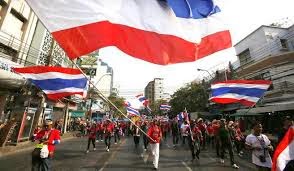Early general elections are being held in Thailand on Sunday, 2 February 2014,[1] after Prime Minister Yingluck Shinawatra asked King Bhumibol Adulyadej to dissolve parliament more than a year early owing to political crisis. Voters are electing a new House of Representatives, the lower house of the National Assembly. Amidst boycott controversies and disruptions by the opposition, the Election Commission offered to postpone the election for four months after the Constitutional Court held that election delay is constitutional. But, after a conference with the Council of Ministers, the commission said the election would go ahead as scheduled.[2]
After the ruling Pheu Thai Party attempted to pass an amnesty bill, the opposition accused them of seeking to bring back convicted former Prime Minister Thaksin Shinawatra, who is in self-imposed exile to avoid facing the punishment for his trial in absentia.
Protests then occurred, sometimes violent, for weeks that evolved into
demands for the government to resign and the Shinawatra family to quit
the politics of Thailand.
Following a mass resignation of opposition MPs, on 9 December Yingluck
said in a televised address that she had asked the King to dissolve
parliament in order to allow the Thai people to resolve the political crisis
in the country. She said: "At this stage, when there are many people
opposed to the government from many groups, the best way is to give back
the power to the Thai people and hold an election, so the Thai people
will decide."[3] However, anti-government protest leader Suthep Thaugsuban
said that the protests would continue till their demands are met in
forming a "people's council", which would be unelected, as "we have not
yet reached our goal. The dissolving of parliament is not our aim."[4] Yingluck also said that she would not resign ahead of the election.[5]
The principle opposition party, the Democrat Party, decided to boycott the election. In response, Yingluck said the election would go ahead as planned.[7]On 26 December the Election Commission held a session at the
Thai-Japanese Stadium in Bangkok in which parties participating in the
election were allocated their positions on the ballot papers for the
national election of members from party lists.[8] A crowd of "several thousand"[9]
protesters from a group called Network of Students and People for
Reform of Thailand attempted to disrupt the registration process by
forcing their way into the stadium. A truck was driven at the gates in
an attempt to break them down. Police responded with tear gas, rubber
bullets and water cannon. The violence escalated with firearms being
used on both sides. A police Sergeant-Major was shot in the chest and
died in hospital. A protester was wounded and later died in hospital.
Despite this attempt at disruption, the registration of candidates went
ahead, although Election Commission staff had to be evacuated by
helicopter when the process was concluded. [10]
Following these events, the president of the Election Commission, Supachai Somcharoen, called for the election to be postponed.[why?]
"It is not hard to predict that the election will not be smooth, fair
and transparent under the current circumstances." In response, Deputy
Prime Minister Phongthep Thepkanchana said: "There is no clause in the charter or any other law which authorises the government to postpone the election date." The Bangkok Post
suggested that the Election Commissioners might resign if the
government did not postpone the election, or they might postpone it on
their own authority, despite lacking legal authority


















0 Comments